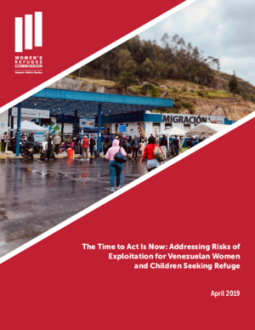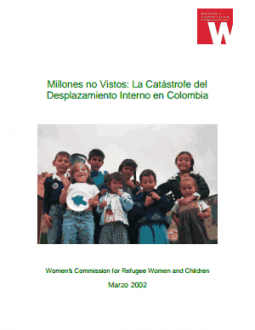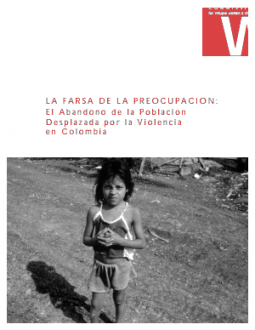
The Time to Act Is Now: Addressing Risks of Exploitation for Venezuelan Women and Children Seeking Refuge
PublishedMore than 3 million people have fled Venezuela since 2015 due to widespread insecurity, the collapse of the economy, lack of food and medicines, and fears of violence, discrimination, and persecution. They have sought safety throughout Latin America and the Caribbean region. Ecuador and Peru are two of the countries hosting the largest number of Venezuelan refugees and migrants. Both countries experienced a huge spike in arrivals in 2018; compared to 2017, there was a fourfold increase in Venezuelan arrivals in Peru, and an almost 300 percent increase in in Ecuador (although more than 80 percent were in transit, mainly to Peru).
The profile of arrivals to these host countries has changed over time: in contrast to earlier arrivals, many of whom were able to support themselves, many of those now seeking refuge have limited financial resources to safely navigate displacement, and there is a higher percentage of women and children. More young women are traveling alone, and many children are unaccompanied or separated from their parents. Venezuelan women and girls fleeing Venezuela are at particular risk of sexual exploitation, especially those who are in an irregular migratory situation and/or undocumented. There are persistent reports of survival sex, sexual exploitation and assault, and sex trafficking. Survival sex is often the only option available to Venezuelan women and children, in order to ensure their own survival and that of family members.
In January 2019, the Women’s Refugee Commission (WRC) conducted a two-country assessment, visiting capital cities and key border crossings in Peru and Ecuador. WRC spoke with UN agencies, government ministries, and social protection authorities, international and local NGOs, faith-based organizations, and Venezuelan women and children. Our findings and recommendations are based on what we learned.
The Time to Act Is Now: Addressing Risks of Exploitation for Venezuelan Women and Children
- The Time to Act Is Now (full report) A4 size
- The Time to Act Is Now (Summary) A4 size
- El Momento de Actuar es Ahora: Haciendo frente a los riesgos de explotación que podrían enfrentar las mujeres, niñas y niños venezolanos al buscar refugio
- The Time to Act Is Now: Addressing Risks of Exploitation for Venezuelan Women and Children Seeking Refuge (full report)
- The Time to Act Is Now (report summary)
- El Momento de Actuar es Ahora (resumen del reporte)



